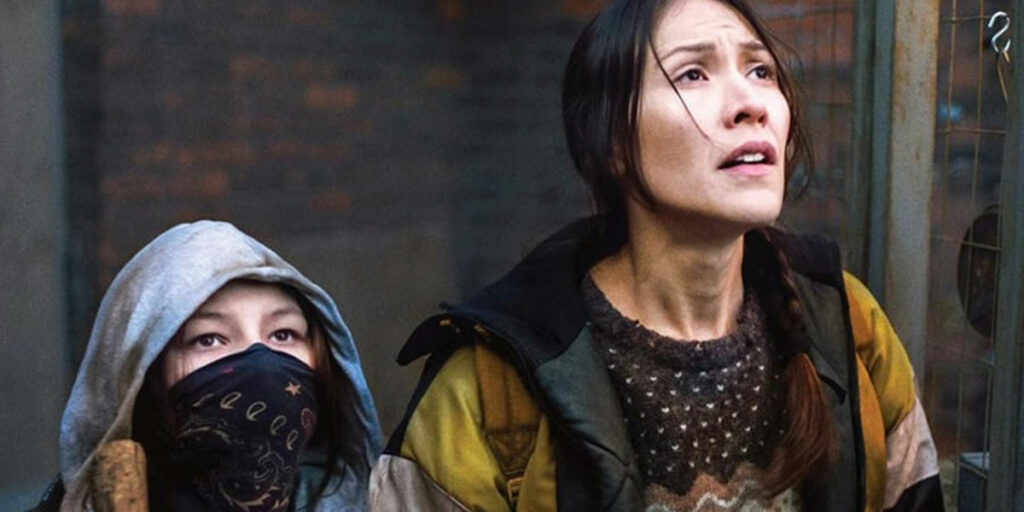Screened at the Mother Tongue Film Festival, Night Raiders delivers on its unique setting with a clear message in spite of some pacing and plot issues.
The Mother Tongue Film Festival, a Smithsonian curated festival highlighting cultural and linguistic diversity, focused on films in Indigenous and minorized languages from around the globe, returned to a physical audience after two years of being online-only. The closing film of the event was the much anticipated Night Raiders, a dystopian science-fiction movie about the abduction of Native Youth under a brutal police state and the parents who must work to save them. The screening was followed by a Q&A panel with director Danis Goulet. The project was eight years in the making with a low budget and minimal support at first, but Goulet was able to take her passion project and make it a reality.
Night Raiders is set in the year 2044, after a horrible pandemic and political corruption lead to the creation of a police state in Canada. The First Nations of Canada are among the worst affected, as they are subjugated by the state and facing the death of their culture. A Cree woman named Niska (Elle-Maija Tailfeathers) and her daughter Waseese (Brooklyn Letexier-Hart) start off the film in the midst of the action, running to keep Waseese out of the oppressive, state-run military academy to which all minors are sent. Waseese is wounded on the way, ending up in the care of the kindly Roberta (Amanda Plummer), but when the wound goes septic, Niska is forced to sacrifice her daughter to the state in order for both of them to survive.
The story that ensues is about Niska and a band of rebels trying to take Waseese back. It is a grueling endeavor complete with drones, code talking, and betrayal, but always riveting and compelling. Goulet said in the Q&A the film was about the importance of kinship. In Cree culture, to say you belong is to have acceptance and earn the right to be accepted by others. To Goulet, the difference between “surviving” and “thriving” is “thriving” means one is deemed deserving of love and kindness, no matter where they come from or how they are doing in life.

Goulet is an exciting director, able to build just the right amount of suspense to make the impact of a scene land. Fight scenes and big action moments are rare, but when they do happen, they always deliver. The movie is paced like a burning fuse, setting up the main action to a boiling point. Every gunshot matters and the drone scenes have tension under them, with real drones used in close-ups to make the experience more authentic.
Niska’s allies are present most of the way, showcasing the other main theme of bonding. Every member of the resistance is played by a Native actor, and together they band together to unite in spite of their differences. Special mention is given to the character of Leo (Alex Tarrant), who is not of First Nation descent but rather Maori. Leo is still an indigenous person even if not to the homeland, and is treated no different from the rest. He is often portrayed as a voice of reason, providing an outsider perspective to the fights.
Separation of children from parents and government control of Native land is a well-worn topic in Native cinema. Seeing these scenarios depicted on film in a futuristic setting is shocking because in many ways, the events depicted in the film have already happened. Night Raiders translates the unjust history for the Natives in the past, and shows how in the future it is still the same story. This showcase of trauma and tying the past into the future made this story a perfect fit for the sci-fi genre. Dystopia is all about bringing out the worst in humanity, showcasing how our flaws and vices lead to a collapse in society. For Natives, they saw their society collapse many times, so translating this narrative to the future is the best way to get audiences to understand their plight.
Some of the downfalls of Night Raiders come from its lack of detailed worldbuilding. Little exposition is given to how the world ended up in its current state. The resistance group and their stories are never told in full. A virus sweeps through the prison camp, as a clear allusion to smallpox which plagued natives in real history, but is never brought up again after it is established. The movie seems to be going for an open interpretation of its conflict, but may end up leaving viewers confused and raising more questions than answers. Also, many moments feel abrupt, with Niska bouncing from character to character with little room for scenes or interactions to sink in. The film’s short runtime of 101 minutes may be a reason for the fast pacing, but leave some viewers wanting a bit more to the story.
During the Q&A, many viewers expressed the desire for a sequel, to which Goulet regrettably answered there were no plans for one at this time. This movie is left as more open ended, so it feels like there should be more to this story. These characters, this setting, and this concept deserve to be explored more. Since the ending does leave room for interpretation and has little closure, the set up is there. A sequel should deliver and continue to expand a universe that needs it.
Night Raiders ends up being a simple story told well. As a dystopian work, it fits with the conventions and does little to reinvent the genre. However, as a film with a clear message and a spotlight of Native culture, it delivers. Modern Native cinema seems to be going for the futuristic and surreal, as many Native directors are given more budget and more leeway with their projects. Denis Goulet is just one of many such directors with an idea in mind and stories to tell. Night Raiders is one of the more accessible and easy to understand titles in the genre, so should make for an optimal gateway into this movement. Though many of its ideas feel a bit underdeveloped, it is a fun ride worth taking.
Night Raiders was screened at the Mother Tongue Film Festival on February 26, 2023. The film is now available to watch on digital and on demand.

